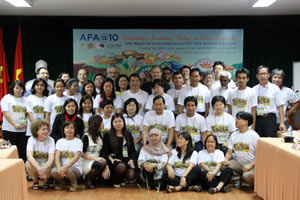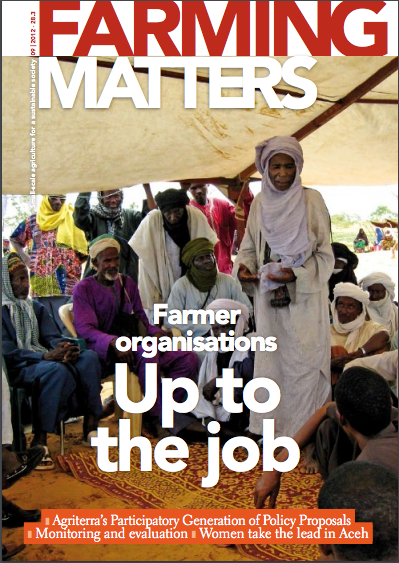Farmer organisations are not a new idea, and their advantages are widely recognised. Yet most are facing new challenges. There is growing competition for land, while international trade agreements are having a very negative effect on rural communities. Food prices are rising and climate change puts additional pressure on farming, but only a few national governments are providing an adequate response. How can farmers work together, and how can their organisations support them? These questions are now more relevant than ever.
Whether they are co-operatives, unions, committees or associations, farmer organisations play an important role in all rural areas. The vast majority of these organisations

are the result of farmers’ own initiatives and willingness to work together, and have been formed with the objective of improving farmers’ incomes and livelihoods. They help farmers acquire inputs or gain access to specific resources, and are part of many commercialisation and value-addition processes.
Farmer organisations, large and small, are a key stakeholder in many capacity building projects and programmes, and in the exchange of knowledge and information at a local level.
The recognition of common aspirations, struggles and experiences is often the stimulus that drives individuals and groups join hands. Yet this is also a response to the need to make ourselves heard at international, regional and also at a national level – especially in the face of the serious challenges the world is facing today.
As a result, a growing number of farmer organisations are advocating farmers’ rights, presenting farmers’ opinions and representing their interests at the national, regional or international level. One of these groups is the Asian Farmers’ Association for Sustainable Rural Development (AFA), a regional federation of farmer organisations in Asia, with members in 10 Asian countries.
The farmers and representatives who came together as AFA in 2002 found out that we shared similar problems and objectives, and that we could achieve these objectives by working together. Ten years later, we are proud to say that we’ve come a long way.
Common challenges
The benefits of working together are easy to see. Our work in AFA, however, has also shown some of the challenges we all face when trying to be heard by researchers and project officers, or when trying to influence policy makers. How can farmer organisations become strong and effective?
The experiences of the various organisations, federations and networks that make up AFA have shown the need to build strong and effective organisations: ensuring that we are relevant, participatory and inclusive, and sustainable. These challenges are dealt with by continuously focusing on each organisation’s governance structures, and also by partnering with supportive individuals and institutions. Just as important, however, is for each organisation to look at the possibilities to draw lessons from their own experience when making future plans.
In a changing context, farmer organisations need to remain relevant and directly related to their members’ needs and aspirations. This is easier when they focus on needs that are felt strongly by farmers, such as securing land rights, ensuring access to seeds, or on improving productivity and incomes. These are issues that are likely to capture the motivation and interest of all members.
The local conditions and contexts in which they operate deserve special attention, as does the need to strike a clear balance between the provision of short-term benefits to individual members, and the long term benefits of the group as a whole. This “balance” defines the objectives of some of AFA’s members. Pambansang Kilusan ng mga Samahang Magsasaka (PAKISAMA), for example, is a national confederation of peasants in the Philippines that has successfully waged campaigns to help farmers gain access to the land they work.
In a similar way, Aliansi Petani Indonesia (API), a peasant federation in Indonesia, has run an effective land reform campaign. Both organisations group many landless farmers and farm workers.
At the same time, farmer organisations need to be strong in order to make the voices of their members heard. In many cases, strength comes in numbers, as seen with the Korean Advanced Farmers’ Federation (KAFF) and their capacity to mobilise thousands of farmers to march on the streets of Seoul, and deliver their demands to government. Strong organisations are also the result of the work of committed and dedicated leaders, and of committed and involved members. This is very clearly seen in organisations like Cameroon’s National Dialogue, or in the Pan-African Farmers’ Organisation (PAFO) – and in leaders such as Elisabeth Atangana.
Farmer organisations are most effective when they develop proposals and activities that are evidence-based and subjected to genuine consultation processes, right down to the village level. This can only be reached if these organisations follow inclusive and participatory approaches. Whether in a district or at an international level, this is achieved through a commitment to democratic governance, and by setting up systems, structures, and policies that encourage the participation of all members, especially women and youth, and that encourage all farmers to join.
This approach partly explains, without a doubt, our success. With activities in different countries, AFA regularly consults its members, from the village to the national level, following participatory research processes where the voices of all groups are heard. As part of these efforts, we encourage the participation of women, both as women farmers’ groups (such South Korea’s Women Advanced Farmers Federation), and also as individuals. In the Philippines, for example, PAKISAMA has adopted bylaws assuring leadership positions for women.
Most important, perhaps, is the need to pay attention to the long term sustainability of farmer organisations. This means developing a long-term vision and approach, and ensuring the continuous presence, support and representation of farmers. It also means securing the necessary funds, and setting up democratic and transparent structures for the use of these funds. This is one of the biggest challenges faced by AFA and its members, and is tackled in different ways.
The Farmer and Nature Net in Cambodia, for example, forms savings groups at the village level, helping farmers develop skills to manage their resources and take on bigger projects and sustain them. Others have membership fees, or are developing their skills to provide specific services.
We are ready
Like many other networks and federations, we in AFA have been struggling to “take root” and make ourselves known and heard at the international, regional, and national levels as a regional alliance of small-scale farmer organisations that represent both women and men. Slowly but surely, these efforts are paying off.
Farmers’ voices have been heard in Rome and in Rio, and farmers themselves are already busy preparing for the 2014 International Year of Family Farming. This demonstrates, as mentioned by the farmers and representatives in Mozambique, that together, we go further.
Marciano T. (Jun) Virola
Marciano T. (Jun) Virola works as knowledge and learning officer at AFA, the Asian Farmers’ Association for Sustainable Rural Development.
E-mail: junvirola@yahoo.com ; afa@asianfarmers.org.
For more information about AFA, please visit their website: http://asianfarmers.org

